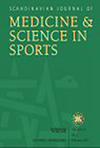No Performance Benefits of Combined Mangiferin and Quercetin Supplementation in Cycling Athletes.
IF 3.8
2区 医学
Q1 SPORT SCIENCES
引用次数: 0
Abstract
The flavonoids mangiferin and quercetin are known for their antioxidant properties. The purpose of this study was to investigate the effects of combined mangiferin and quercetin (MQ) supplementation during prolonged intermittent cycling on sprint performance and 15-min time trial performance (15-min TT). Fourteen trained male endurance athletes (age 26 ± 5 years; body mass 80.7 ± 4.8 kg; stature 184 ± 7 cm; V̇O2peak, 63.0 ± 8.9 mL min-1 kg-1), initially completed a 15-min TT in a fresh state to determine their maximal mean power output (MPO15). On two separate days, participants then completed a 4-h intermittent cycling protocol at 60% of MPO15, interspersed by 6- and 15-s maximal sprints every hour, as well as 30-s intervals at 120% of MPO15 twice per hour. Upon completion of each protocol, participants immediately performed another 15-min TT. During the 4-h protocol, participants consumed 100 g CHO·h-1. In addition, participants consumed 14.6 mg h-1 of mangiferin and 23.9 mg h-1 of quercetin in one of the trials, mixed into the CHO solution. Both trials showed similar reductions in 6-s peak power (MQ: -59 ± 82 W; Control: -42 ± 75 W, time effect: p = 0.007) and 15-s average power (MQ: -37 ± 50 W; Control: -19 ± 35 W, time effect: p = 0.02) during the 4-h protocol (trial × time: p = 0.35 and 0.34, respectively). Additionally, no difference was observed between the two conditions in 15-min TT performance following the 4-h protocols (MQ: 339 ± 56 W; Control: 341 ± 54 W, p = 0.61). In conclusion, combined mangiferin and quercetin supplementation during prolonged intermittent cycling did not affect sprint or time trial performance in trained endurance athletes.联合补充芒果苷和槲皮素对自行车运动员的表现没有好处。
芒果苷类黄酮和槲皮素以其抗氧化特性而闻名。本研究的目的是研究在长时间间歇循环期间联合补充芒果苷和槲皮素(MQ)对短跑成绩和15分钟计时赛成绩(15分钟TT)的影响。14名经过训练的男性耐力运动员(年龄26±5岁,体重80.7±4.8 kg,身高184±7 cm, V (o) 2峰值63.0±8.9 mL min-1 kg-1),在清醒状态下进行15分钟TT试验,测定其最大平均功率输出(MPO15)。然后,在两天内,参与者以60%的MPO15完成了4小时的间歇骑行方案,中间每小时进行6秒和15秒的最大冲刺,以及每小时两次以120%的MPO15进行30秒的间歇。每个方案完成后,参与者立即进行另一个15分钟的TT。在4小时方案中,参与者消耗100 g CHO·h-1。此外,在其中一项试验中,参与者摄入了14.6 mg h-1的芒果苷和23.9 mg h-1的槲皮素,混合在CHO溶液中。两项试验均显示,在4小时的治疗方案中,6秒峰值功率(MQ: -59±82 W;对照组:-42±75 W,时间效应:p = 0.007)和15秒平均功率(MQ: -37±50 W;对照组:-19±35 W,时间效应:p = 0.02)的降低相似(试验×时间:p分别= 0.35和0.34)。此外,在4小时方案下,两种情况下15分钟的TT性能没有差异(MQ: 339±56 W;对照组:341±54 W, p = 0.61)。总之,在长时间间歇骑行期间联合补充芒果苷和槲皮素不会影响训练耐力运动员的短跑或计时赛成绩。
本文章由计算机程序翻译,如有差异,请以英文原文为准。
求助全文
约1分钟内获得全文
求助全文
来源期刊
CiteScore
7.90
自引率
4.90%
发文量
162
审稿时长
3 months
期刊介绍:
The Scandinavian Journal of Medicine & Science in Sports is a multidisciplinary journal published 12 times per year under the auspices of the Scandinavian Foundation of Medicine and Science in Sports.
It aims to publish high quality and impactful articles in the fields of orthopaedics, rehabilitation and sports medicine, exercise physiology and biochemistry, biomechanics and motor control, health and disease relating to sport, exercise and physical activity, as well as on the social and behavioural aspects of sport and exercise.

 求助内容:
求助内容: 应助结果提醒方式:
应助结果提醒方式:


